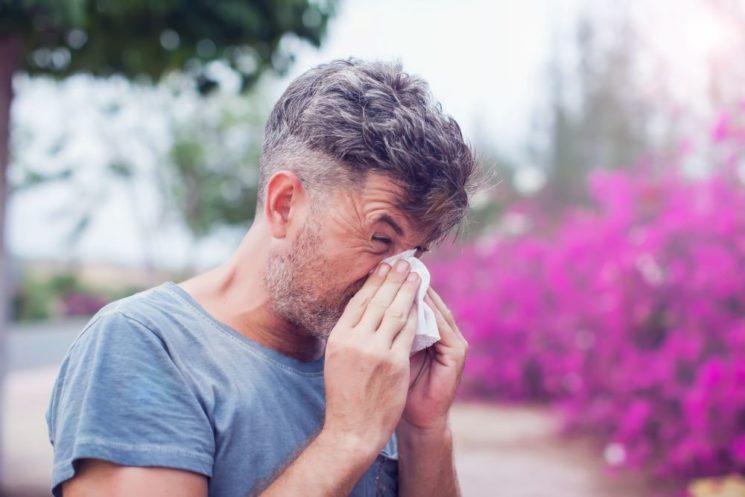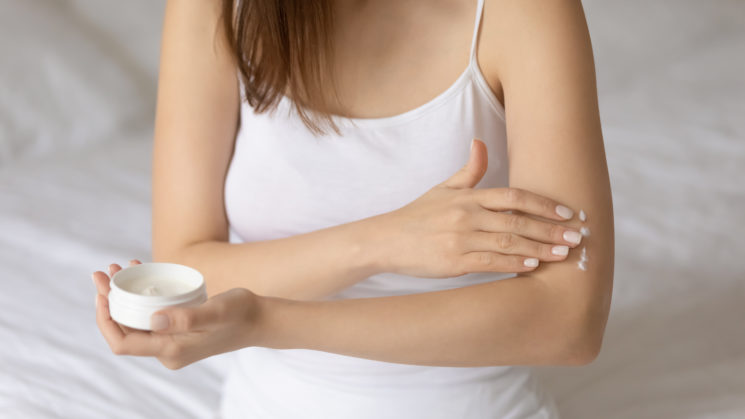
Hay fever, also known as seasonal allergic rhinitis, is very common, affecting about 1 in 5 people in the UK.
It is caused by an allergic reaction to pollen from grasses or trees during the spring and summer months. This leads to symptoms including sneezing, a runny or blocked nose, itchy, red eyes, and occasionally cough or wheeze.
We spoke to Dr Helen Cox, Consultant Paediatric Allergy Specialist, to find out more about treatment options.
What is hay fever?
Pollen contains tiny proteins or allergens, which become airborne at specific times of the year. For hay fever sufferers, the immune system mistakes these harmless proteins as harmful intruders, leading to an allergic reaction triggered by the body producing antibodies in response to the pollen allergens. This triggers the release of histamine, leading to the onset of typical symptoms.
You may be allergic to one or more types of pollen. This will determine when your symptoms are most severe. Tree pollens typically cause symptoms in spring, whilst grass pollens tend to cause symptoms in the summer months.
Hay fever, asthma, food allergies, and eczema are related allergic conditions and you’re more likely to develop them if they run in your family.
Hay fever symptoms
The symptoms of hay fever include:
- sneezing
- a blocked or runny nose
- itchy eyes, nose, throat, and roof of your mouth
- red or watery eyes
- postnasal drip (mucus dripping down your throat from the back of your nose) – this might make you cough
- headache
- fatigue
- asthma symptoms – such as wheezing and breathlessness, which may get worse if you already have asthma
In more severe hay fever, nasal congestion and cough can lead to significant sleep disruption which in turn affects daytime concentration, work output, and exam performance.
Typical hay fever symptoms secondary to pollen allergy usually resolve during the autumn and winter months. When symptoms persist all year round, other allergens are likely to be involved. These include reactions to house dust mite allergen, animal dander (cat, dog, horse), and mould spores (perennial allergens).
How is hay fever diagnosed?
Doctors can usually make a diagnosis based on the onset and duration of symptoms and the patient's medical history.
Allergy testing (skin prick test or blood test) is useful when there is no clear trigger for a patient’s symptoms or when symptoms are more prolonged and severe.
1. Avoiding allergic triggers (pollens, moulds, house dust mite etc.).
It is impossible to totally avoid pollen, but symptoms tend to be less severe if you reduce your exposure to pollen. Keeping an eye on the pollen count can help you manage your hay fever symptoms.
The pollen count is the average number of pollen grains in one cubic metre of air over 24 hours. There are pollen counts for grass, tree and weed pollen, and fungal spores. The pollen count is classed as low, moderate, high, or very high.
The weather can affect the pollen count – it’s generally higher on dry, sunny days, and lower on rainy days.
Antihistamine tablets for hay fever
Antihistamines tablets usually reduce sneezing and an itchy, runny nose but may not help as much with a blocked nose. They have a rapid onset of action being effective within the hour. Many antihistamines can be bought from a pharmacy or the supermarket.
It is important to choose non-sedating antihistamines for the treatment of hay fever. Occasionally these still cause some drowsiness but are tolerated well by most individuals.
Driving or operating heavy machinery should be avoided if antihistamines provoke drowsiness.
Hay fever nasal spray
Antihistamine nasal spray can ease itching, sneezing, and watering within 15 minutes or so.
It may not be so good at easing congestion though. Steroid nasal sprays and drops can improve or prevent all nasal symptoms (such as sneezing and a blocked nose) and help ease eye symptoms.
A steroid spray may take some time before it starts to work, so it needs to be used for at least two weeks before symptoms usually start and then every day during the hay fever season. Make sure you take the lowest dose that works for you and be aware that you may have some mild side effects, such as irritation in the nose or nosebleeds.
Many antihistamine nasal sprays are available as over-the-counter medicines from a pharmacy. There are also nasal sprays available on prescription that contain steroids and antihistamines if your symptoms are more severe.
Decongestant nasal sprays are usually restricted to a few days use only, as more sustained use can make symptoms worse, causing persistent nasal congestion. Frequent use of decongestant sprays should be avoided.
Sinus rinses can be helpful to combat nasal decongestion during the worst weeks in those with more severe disease.
Hay fever eye drops
Antihistamine eye drops usually work well for itchy or sore eyes and are available without a prescription from your local pharmacy.
If you are taking hay fever medication regularly and your symptoms are well controlled, you should continue this treatment until the end of the pollen season.
Steroid tablets for severe hay fever
A short course of steroid tablets can be prescribed on rare occasions for severe symptoms which are not eased by other treatments. However, steroid tablets shouldn't be taken for long periods to treat hay fever as they can cause serious side effects.
3. Try immunotherapy.
If all other treatments are not working, your GP may refer you to see an allergy specialist, who may offer you immunotherapy (sometimes called 'desensitisation').
Immunotherapy involves being given doses of the pollen you’re allergic to over three years. It helps ‘reset’ your immune system, so it no longer thinks the specific allergen you’re allergic to is a threat. The effect of immunotherapy lasts for many years after cessation of treatment.
Whilst immunotherapy is a highly effective treatment, it is expensive and time-consuming. It is therefore only offered to patients with more severe hay fever symptoms that persist despite treatment. It’s available as injections, drops, or a tablet which dissolves under the tongue.
Asthma and hay fever
If you have hay fever, you are more likely to develop asthma.
Some people have asthma symptoms only during the hay fever season, but if you already have asthma this may become worse in the hay fever season. You may need to increase the dose of your usual inhalers (or other treatment that you take for asthma) during the hay fever season.
Hay fever treatment at home: Self-help tips
There are several actions you can take to help manage your hay fever.
- When the pollen count is high, stay indoors as much as possible and keep doors and windows shut.
- Wear wraparound sunglasses to protect your eyes when outdoors.
- Take a shower and change your clothes after being outside.
- Keep your car windows closed and fit a pollen filter to your air vent.
- Stay away from grassy areas, especially during the early morning and evening when the pollen count is highest.
- Apply a balm, such as Vaseline, around your nostrils to reduce how much pollen enters your nose.
- Don’t dry your washing outdoors, as pollen can get trapped in the clothing fibres.
Why have I suddenly developed hay fever?
There are many reasons why someone might appear to suddenly develop hay fever.
It’s likely that something in your environment triggered you – particularly if you have recently made a major change, such as moving home. However, it’s also possible you had allergies all along, but the symptoms were too mild to notice.
How long does hay fever last?
Depending on how severe your hay fever is, symptoms can begin as early as March and last until September.
Hay fever symptoms can last for several months at a time, which is why it’s important to find an effective way of managing your allergy.


